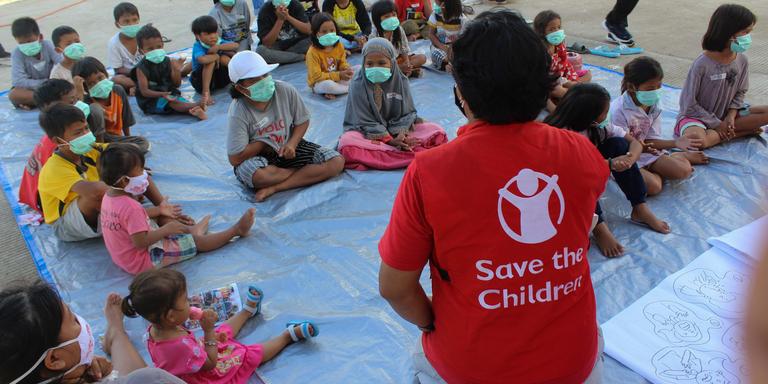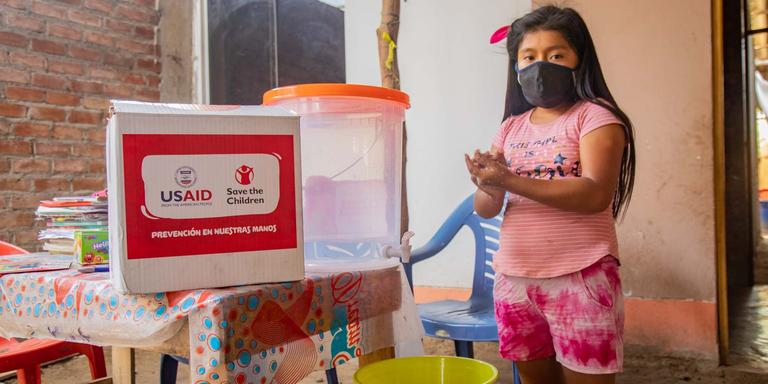
The 91�ֿ� response team educates children in Mamuju, Indonesia, about the dangers of COVID-19 and how to prevent it.��
We Need Vaccines for All – Not For the Few
Written by Nora O’Connell, Vice President, Public Policy and Advocacy
The COVID-19 pandemic has wrought such deep devastation in America, it’s been hard to see beyond our own borders. However, as the roll-out of vaccines in our communities offers hope, we must face a wider truth: COVID-19 is a threat everywhere. In today’s interconnected world, that means that we must mobilize to fight the pandemic and its cascading impacts both here and around the world if we are ever to recover.
President Biden’s to fight the pandemic includes international funding – less than 0.6% of the overall proposal, but critical nevertheless. As Congress finalizes and passes the bill, it is vital that this funding remains intact. This will help low and middle-income countries access vaccines to stem the spread of the virus, as well as technical and monetary support to address other life-threatening impacts of the pandemic such as food insecurity, gender-based violence, and loss of education, among others.
Vaccines Should not be “Pay to Play”
COVID-19 is a global problem; it cannot have only a domestic solution. If we put aside middle and low-income nations’ needs in favor of perceived self-interest, we are dooming them and ourselves to further disease and debilitation.
Equitable vaccine distribution acknowledges that no nation, state, or individual’s life is more important or more deserving than another’s: all people deserve the opportunity to receive a vaccine.
In contrast, vaccine nationalism and protectionism harm the most vulnerable children and families around the world; they also harm the United States.
This reality is becoming even more apparent as emerging virus variants threaten our already strained health infrastructure, and economic restrictions continue to encumber our society. A study conducted by the estimates that the impact of vaccine nationalism and protectionism could cost the global economy over $9 trillion and the US economy between $45 billion and $1.38 trillion. Conversely, if the U.S. and others were to invest $27.2 billion in vaccine development, production, and equity, the global economy could generate as much as 166 times the initial investment.
As the World Health Organization and numerous other multilateral and non-governmental organizations have identified, if we are able to distribute vaccines equitably and fairly across the globe, we will be able to accelerate the process of reopening our societies and economies.
Ending the pandemic around the world will allow us to support and protect an entire generation of vulnerable children from falling further behind.

In Peru, Ariana practices handwashing and hygiene with 91�ֿ� and USAID support.��
Addressing the Cascading Impacts of COVID-19
Addressing the impacts of the pandemic must go beyond infection numbers and death rates. For children, this is especially true.
According to 91�ֿ� surveys, the COVID-19 pandemic and the resulting school and economic closures have severely impacted the lives and development of the most vulnerable people in our societies. Around the globe, nearly 80% of parents or caregivers believe their children have learned little or nothing due to school closures and limited access to resources, and it is possible that 10 million children may never return to school when classrooms reopen.
Children are also facing increased risks for malnutrition, abuse, and neglect, and these numbers are even more disastrous for girls and children with disabilities who are already at a higher risk of exploitation. According to a 91�ֿ�’s study, 2.5 million more girls are expected to be married in the next 5 years.
Countries already experiencing conflict are being hit especially hard during this pandemic, with dangerous increases in the number of children and families suffering from acute malnutrition. 91�ֿ�’s report on childhood nutrition projects that an additional 168,000 children will die from malnutrition this year due to the consequences of COVID-19. Refugees in Bangladesh, Syria, Yemen, and Colombia are all at increased risk for illness, malnutrition, and sexual and gender-based violence.
It’s clear that a global response to COVID-19 must go beyond vaccine distribution and delivery. The U.S. global response plan must also include strategies for addressing gender-based violence; helping the most marginalized children – including refugee children, girls, and children with disabilities – access learning during school closures and safely return to school; and working with local governments and communities to build resilient health systems to help prevent future outbreaks from spiraling out of control.
91�ֿ� urges the U.S. to embrace a spirit of solidarity in the global response to COVID-19, for our own nation’s sake, as well as the sake of others. As an immediate first step, Congress must approve the proposal for international funding in President Biden’s American Rescue Plan. In the coming months, the Biden Administration must devote further attention to facilitating equitable vaccine access globally, including by donating surplus doses to countries in need, and to supporting broader recovery efforts.
Building back better, in America and around the world, depends on it.
